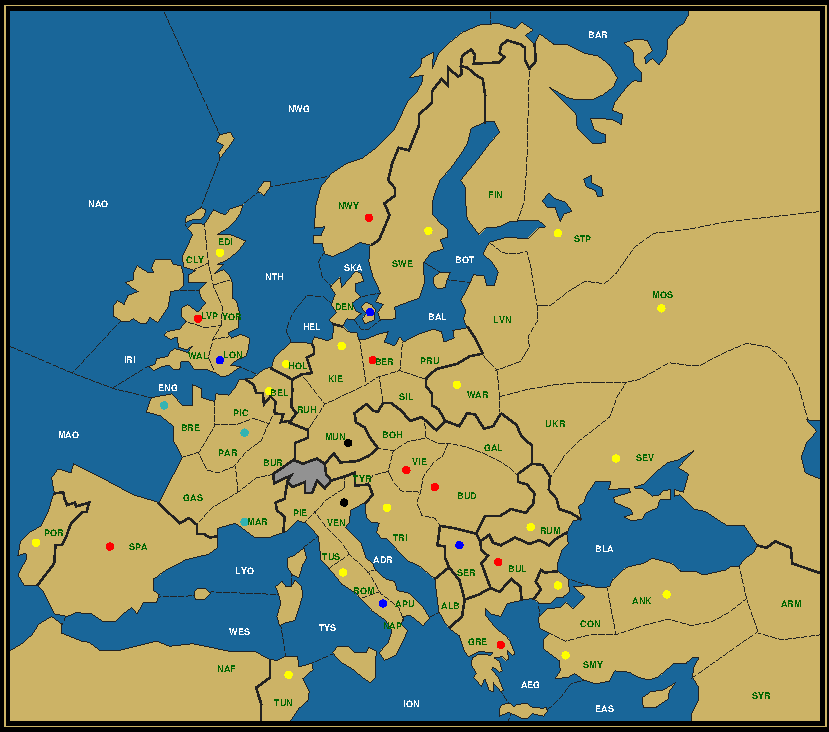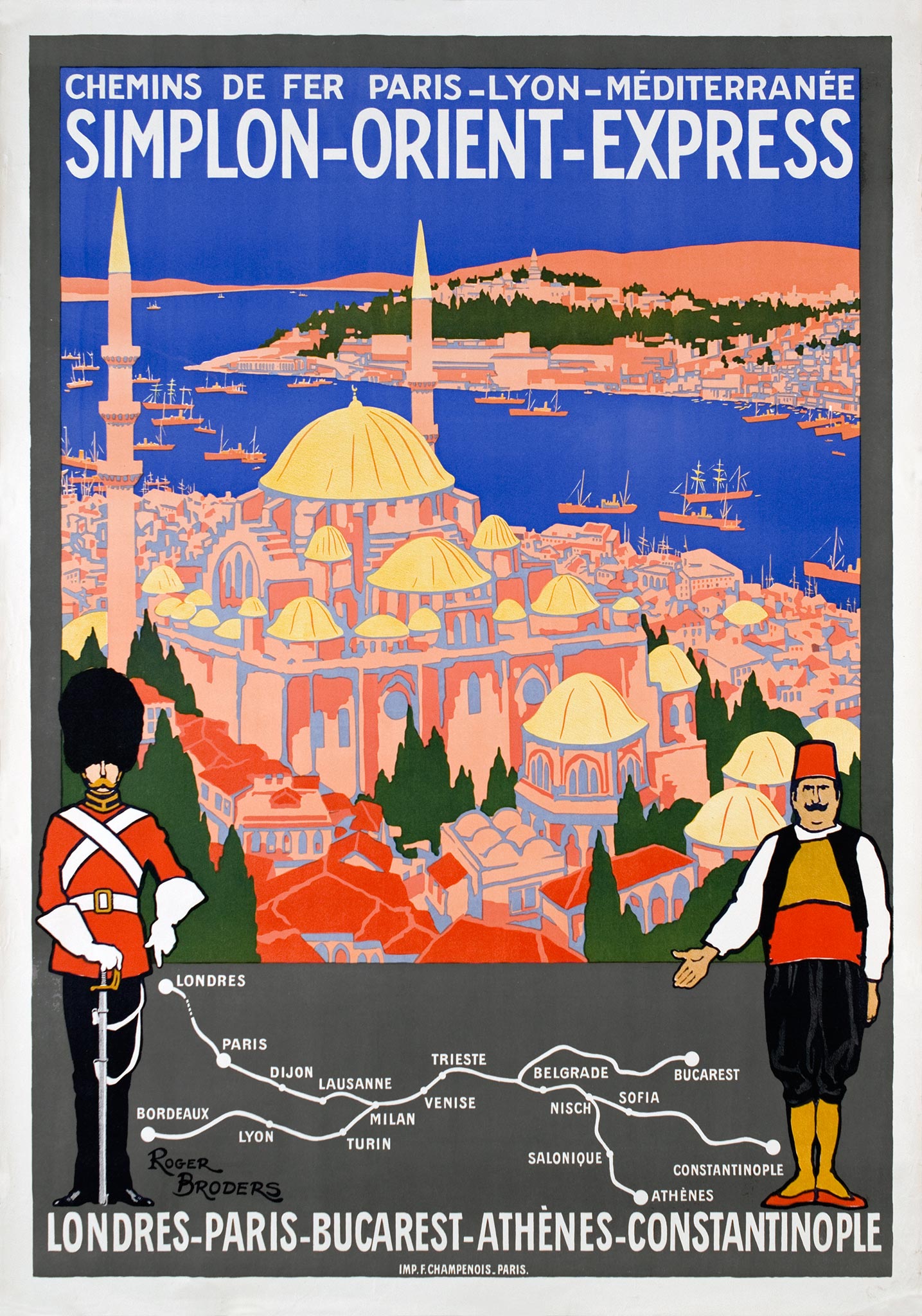
Sherlock Holmes,
Consulting Diplomat
by Mario Huys,
Master Ænigmatist



|
Sherlock Holmes,
|
In the previous episode Holmes and Dr. Watson received an exotic visitor for coffee. Dr. Tinder, an alias for the recently coronated young Sultan of Suwat, brought with him a Diplomacy map and a mysterious note for a romantic rendez-vous with a smart young lady that he had met in Paris. To see her again he would have to catch a train in a fortnight, departing at 17:34 from one city in Europe and bound to another, that were the locations of two army units, one from Paris, one from London, on the accompanying map. There was just one tiny problem: There were no units on the map, only supply centers in various colors. What could this mean? 
The three of us looked together at the map. Holmes took a sip of his Turkish coffee, then looked up at me. "Watson, where are my manners? Let me make you a cup. Sugar?" "No, really, Holmes, you don't need to. My stomach has never quite accustomed itself to the oriental taste, not since my days in Afghanistan as an army doctor. I'll be quite alright with an espresso, black." "Even an oriental like me appreciates an Italian espresso from time to time," Sir Warwick Tinder, a.k.a. the Sultan of Suwati, remarked. "Although I prefer it the oriental way, lots of sugar." "An oriental espresso," Holmes quipped. "As you wish—" As he dragged out the last syllable in a long hiss, he suddenly locked eyes with our guest. "The Orient Express!" "Venice to Constantinople," said the latter. Holmes looked at the map and nodded. For my part, I was perplexed. "What are you two talking about?" "It's quite simple really," he said. "A French and an English army travel on the route taken by the Orient Express. The French army travels from Paris to Switzerland and then on to Venice." Our guest continued, pointing out the places on the map. "Meanwhile the London army got ahead of him and was already in Serbia, as the blue dot indicates. From there in a year time he reaches Constantinople, the end destination." I shook my head. "No, that's not what I meant. A few years ago —this was before the Great War— I was invited to a medical congress in Vienna. So I boarded the Orient Express in Paris, from where it passed through Munich on its way to the Austrian capital. Never did it pass through Italy." "You're talking about the old route, dear Watson," Holmes remarked. "A new line was inaugurated after the War, the Simplon Orient Express, so called because it passes through the Simplon tunnel into Italy and continues South of the Alps to Venice and then on to Trieste and Constantinople."  "It's a very convenient route," continued Sir Tinder. "I frequently make use of it. I love the comfort and the speed." "Case closed then," I concluded. "You can go to Venice and book your 17:34 ticket." But to my surprise he started shaking his head. "That will be quite impossible. There's only a single train per day, and it leaves Venice in the early afternoon. By the time mentioned it's already crossing the border into Serbia." The three of us stared at each other, then back to the map and the note. Finally I broke the silence. "This timing might be a hint. Count the number of centers Turkey owns. There are 17. And 34 is of course the total number of centers, but also the exact double of 17. In other words one player has lined up his units such that in the next round or game year he can conquer the whole board." "Turkey? But then Paris and London are targets, not starting points." Sir Tinder's protest didn't yet discourage me. "Perhaps one player controls all the other powers, as in those variants where you start with an empty board, but the centers have been doled out in some random fashion and players get a combination of powers to make it more balanced. This could be an extreme example with just two players involved: Turkey against the rest of the board." He was still not convinced. "Even if so, surely the 17 Turkish units will easily prevent the other side from conquering all its centers in a single year? Assuming that one can build in every owned center." "Perhaps he foregoes his builds, taunting the other to take him out and claiming victory if it can't be accomplished. Weird. But as it's a puzzle, let's go with this hypothesis. We know that an army was built in Paris and in London. Paris can only take Belgium, London Edinburgh." Holmes interrupted me there. "But Edinburgh is also Liverpool's only possible Turkish center." "Indeed it is. How odd. Is there a mistake in the puzzle? A fleet in London at least could also get to Holland." "Which is not a city," he remarked. "Nor is Belgium, unless you reduce them to their capitals Brussels and Amsterdam, as some people are prone to do. But what is even more telling is that the riddle speaks of the "first" army Paris, suggesting that more than one was built." "Good heavens!" I exclaimed. "If there's more than one build, we're talking about two years or more, perhaps even a boundless number. These armies could end up anywhere!" "No, the number of years is bound to be limited. If I'm not very much mistaken, there are exactly four." Scarcely taking notice of our surprise, he continued: "But what do you make of that other number in the riddle, the fortnight?" "It's just setting a date, no?" said Sir Tinder with a hint of anxiety. "That too. But a fortnight literally means fourteen nights. Subtract from seventeen and you get three, the number of French centers. Which also happens to be his home centers, unlike the other three powers who only own some of their home centers, combined with some other centers." "I noticed that too," I said. "Germany, England and Austria's centers are distributed a lot more haphazardly. Increasingly so, I'd say." "Increasingly, yes, haphazardly, not at all," Holmes replied with a grin. "Let's say France starts with her usual 3 units, army Paris, army Marseilles and fleet Brest. She sends them out and captures a few centers. She then builds more units to capture even more centers and repeats this until she has conquered the whole board." "And what are the other powers doing?" "There are no other powers. The colors indicate which centers were captured in each consecutive year." "In other words," said Sir Tinder, "the two German centers of Munich and Venice are the centers captured the first year, the four English centers those for the second year, the eight Austrian centers those in the third year, and the rest, the Turkish centers, are the target for the final year. Brilliant! France doubles her total every year, conquering the whole board in the shortest amount of time." "Against no opposition," I added. "But then the army in London is actually itself a French army, built after the capture of London. Just like army Paris. Truly a Double French. Impressive."
...and when you are ready to continue, click here....— Dr John H. Watson
|

